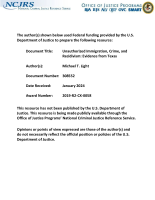Traffic offenses
Use of Electronic Monitoring in the United States: 1989 Update
Evaluation of Administrative Per Se Laws
Crime in Sweden - Causality, Control Effects and Economic Efficiency
Unauthorized Immigration, Crime, and Recidivism: Evidence from Texas
Criminal Record Questions in the Era of "Ban the Box"
Booker and Beyond Analyzing Sentencing Reform and Exploring New Research Directions
This webinar features a discussion of previously published research on the U.S. Supreme Court’s 2005 Booker decision - which effectively transformed the United States Sentencing Guidelines from a mandatory, to an advisory, system. The presentation will address selected research findings from the last 15 years. Individual participants will briefly review their previous research findings with particular attention paid to the analytic methods used.
See the YouTube Terms of Service and Google Privacy Policy
Self-Reports of Police Speeding Stops by Race: Results From the North Carolina Reverse Record Check Survey
Mapping Programs Target Alcohol-Impaired Driving
Launching a Red-Light Camera Program
Searching for the Denominator: Problems With Police Traffic Stop Data and an Early Warning System Solution
Webinar Focuses on Reducing Traffic Fatalities
Familial DNA Searching: Issues and Answers
Familial DNA searching is the practice of creating new investigative leads in cases where DNA evidence found at the scene of a crime strongly resembles that of an existing DNA profile but is not an exact match. Panelists will explain how the technology works, provide examples of successful convictions obtained through familial searches, and discuss the various misconceptions and concerns regarding this practice.


